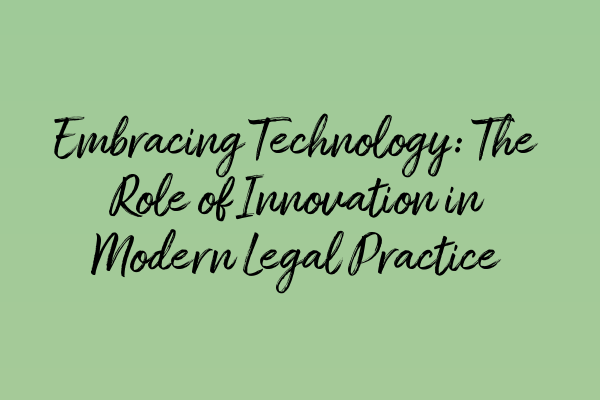Embracing Technology: The Role of Innovation in Modern Legal Practice
In this rapidly evolving digital age, the legal industry is experiencing a significant transformation. The traditional notions of legal practice are being challenged by emerging technologies and innovative solutions. As a forward-thinking solicitor, it is essential to embrace these technological advancements to remain competitive and provide the best service to clients. In this blog post, we will explore the role of innovation in modern legal practice and how it can revolutionize the way legal professionals work.
One area where technology is making a profound impact is in legal research. Gone are the days of spending countless hours sifting through stacks of law books in a library. With the advent of online databases and AI-powered legal research tools, solicitors now have access to a vast array of legal information at their fingertips. These tools not only save time but also enable solicitors to conduct more comprehensive research, leading to better-informed decision-making.
Moreover, technology has brought about a significant shift in how legal professionals communicate and collaborate. Email and instant messaging platforms have replaced traditional letters and faxes, allowing solicitors to communicate with clients and colleagues more efficiently. Virtual meeting tools have made it possible to have face-to-face meetings with clients and stakeholders, regardless of geographical boundaries. These advancements in communication technology have streamlined the legal process, resulting in improved client satisfaction and enhanced work efficiency.
Another area where innovation is revolutionizing legal practice is document automation. Drafting legal documents can be time-consuming and prone to errors. However, with the help of document automation software, solicitors can now generate leases, contracts, and other legal documents quickly and accurately. These tools not only increase productivity but also minimize the risk of human error, ensuring the legal documents are error-free and adhere to the required standards.
Beyond research, communication, and document automation, technology has also played a crucial role in transforming client interactions and the delivery of legal services. Online platforms and mobile applications have made it easier for clients to access legal services and stay updated on their cases. Solicitors can now provide real-time updates, share important documents securely, and offer virtual consultations, making legal services more accessible and convenient for clients. This technology-driven approach fosters transparency and trust between solicitors and clients, leading to stronger client relationships and higher client satisfaction rates.
Furthermore, the rise of artificial intelligence (AI) is transforming the way legal professionals approach tasks such as legal analysis, due diligence, and contract review. AI-powered software can analyze vast amounts of data quickly and accurately, allowing solicitors to identify patterns, predict outcomes, and make more informed decisions. This technology not only saves time but also reduces costs, as tasks that were previously time-consuming can now be automated. This enables solicitors to focus on more complex and high-value work, further adding value to their clients.
As solicitors continue to embrace technology and innovation, it is important to stay informed about the latest legal tech trends and advancements. Continuing professional development (CPD) programs, conferences, and industry publications are great resources for staying up-to-date with the latest technological developments and their impact on the legal profession. By actively engaging with the legal tech community, solicitors can identify opportunities to leverage technology to improve their practice and gain a competitive edge.
To conclude, embracing technology and innovation is no longer an option but a necessity for modern legal practice. Incorporating technology into daily workflows can enhance productivity, improve client satisfaction, and enable solicitors to deliver legal services more efficiently and effectively. By leveraging legal research tools, communication platforms, document automation software, and AI-powered solutions, solicitors can stay ahead of the curve and provide exceptional legal services in this ever-evolving digital landscape.
For more information about legal education and practice, please check out our related articles:
– A Closer Look at the Bar Professional Training Course (BPTC)
– The Role of Technology in Modern Legal Practice
– Financing Your Law Degree: Understanding Costs and Options
– A Look into Prominent Law Firms in the UK
– Staying Ahead: Current Legal Industry Trends in the UK


Leave a Reply